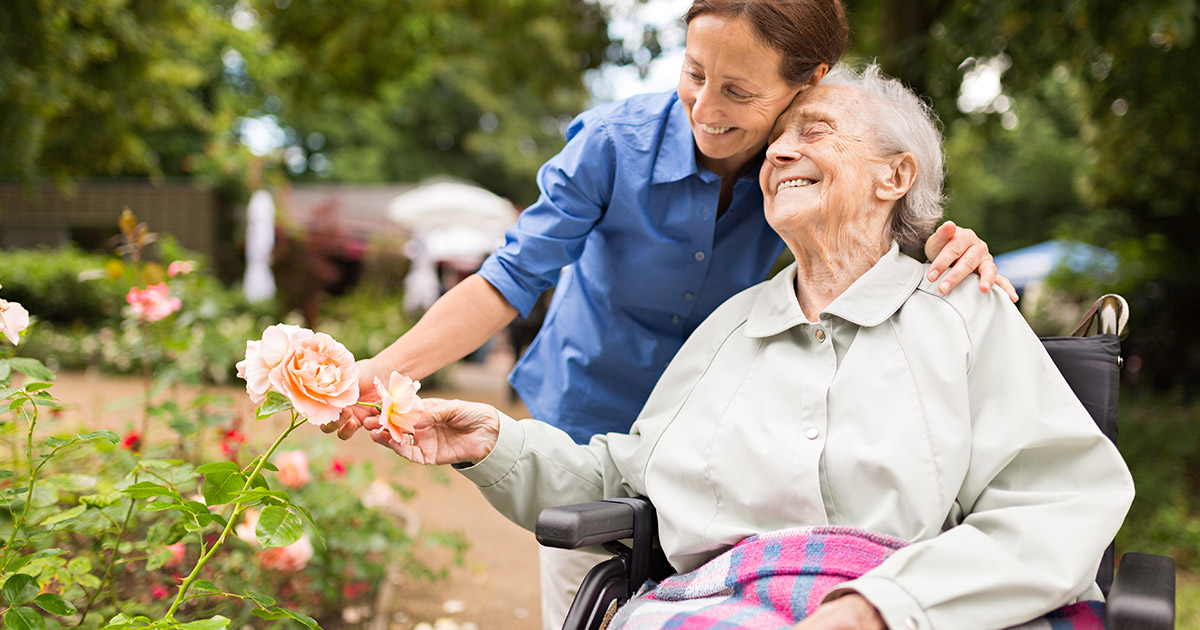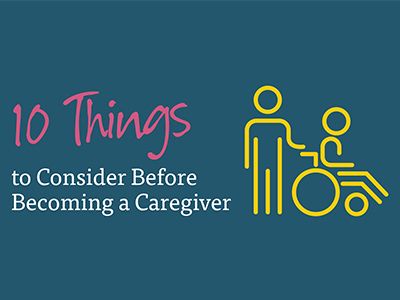As the medical industry discovers new information and develops new treatments for diseases and injuries, more and more Americans are living longer and more productive lives. But at some point, even generally healthy elderly adults may need help with day-to-day tasks. As a result, more adult children are becoming the primary caregiver for their parents.
In fact, almost 17% of Americans provide unpaid care to an adult over the age of 50. Before making the decision to become the primary caregiver for a parent, consider the following key issues and scenarios.
- Are you up to the physical challenge of caregiving? Many people sign up to be the primary caregiver out of a sense of duty or even guilt. While these feelings are admirable, you may not be entirely prepared for the roller coaster of emotions and physical stress that can be taxing for even the strongest person.
Depending on the amount of care your parent requires, you may have to help with a variety of tasks. Physically, you may have to assist when they sit down and get up. Individuals who are unaccustomed to lifting often find themselves with pulled or strained muscles. Other tasks may include bathing, dressing, feeding and assisting with bathroom trips. You may be required to administer medical care, which could include daily doses of medicine, possibly including injections. Wound care is also a frequent job for caregivers.
- Consider the time caregiving will take. Caring for an elderly parent demands a considerable amount of time. Your will have to adapt your schedule to fit their lives too. Driving them to doctor’s appointments or their weekly hair appointment might need to take precedence over things you would do normally. Make sure to consider how this time will affect your children and spouse. They sometimes view time spent with your parent as time taken from them. Also, make sure to avoid burn out by proactively planning guilt-free downtime for yourself. Personal sacrifices of time can create feelings of resentfulness toward a parent.
Additionally, consider how long you will be able to take care of your parent. As people live longer, the time spent under the care of someone else naturally increases. Are you looking at 2 years, or possibly 20?
- Join a caregiving support group. Caring for aging parents requires a strong support group. People in your support group should be willing to listen, and to lend a hand when needed. Other family members spring to mind first as a primary support group. However, when they are not available, caregivers support each other in many cases. Look for groups that meet regularly in your area. Many people decide they can handle the responsibilities alone, but emergencies are bound to occur. Who would be there if you had to be hospitalized or couldn’t get to your parent?
- Carefully balance work and caregiving duties. If you work outside your home, you need to discuss how caregiving will affect your job. Do you have an understanding employer who will make concessions for you? Caring for the elderly may mean that you may arrive to work late, leave early, or miss work to attend doctor appointments. You also might be available only by phone or not available to travel for business. Depending on the demands of your job, your employer may take issue with one or more of these disruptions. Speak openly and work together for a solution that fits both your needs and your employer’s needs. Also, consider the potential for taking leave to care for your parent using the Family and Medical Leave Act, which requires covered employers to provide employees job-protected and unpaid leave for qualified medical and family reasons.
- Gain knowledge about caregiving and consult resources. Family caregivers may jump in and assume that they can handle the responsibilities without issues. However, professional assistance may be a better option for your parent. Honestly evaluate how much you know about elder care. A professional intimately knows many diseases that afflict the elderly, early symptoms, and actions to assist your parent during the transition stage and beyond. Not having this knowledge may not be a problem if you have the resources available to obtain the information and skills needed.
- Consider a parent’s medical condition – and needs. Part of the caregiver job includes researching medical conditions. Be prepared for things to come by educating yourself about a parent’s illnesses or conditions. Diseases typically progress as your parent ages, symptoms increase, and new ones develop. Your parent’s physician should be able to recommend books or other resources with information about your parent’s current conditions and any possible progression. By knowing what to expect, you can make a better decision regarding your parent’s care and your level of involvement. Details about their conditions allow you to advocate for the best treatments for them.
- Look for behavioral changes. Invariably, old age forces behavioral and personality changes in people. Many times, especially in cases of dementia, a caring, gentle parent will voice hurtful opinions or statements toward their primary caregiver. Will you be able to handle being screamed at for something you didn’t do? Frustrations also manifest themselves physically. Some people become violent and even dangerous. As their child, you will be emotionally invested in the care, but try not to take their actions personally.
To prevent these episodes, find out what triggers them. Hurtful words and actions stem from a variety of situations including confusion, frustration with recognizing objects, an uncomfortable environment or embarrassment. You can diffuse such situations by remaining calm, validating their feelings, and smiling. Also, try to keep a steady routine, and label rooms and common household items.
- Assess their cognitive abilities. Many times, the first indication that at-home caregivers may be necessary is a parent’s inability to make good decisions. Cognitive abilities such as the ones needed to plan, organize and make decisions deteriorate more quickly than memories. Consider how this will affect your daily life. Items may be lost in unusual places like the refrigerator and you may need to screen phone calls for scams. Also, as the primary caregiver, you become their recreation director. Focus on ways to engage their minds using their interests. As cognitive abilities deteriorate, you may have to adapt their activities.
- Consider their living situation. As with any decision, logistical and financial implications must be considered for both your parent and your household. As the primary caregiver, you will need to decide where your parent will live. Will they live in your home or an apartment nearby? A popular trend is granny pods, a small freestanding structure located near the home that allows mom or dad to retain some independence and privacy while still being close. Think about the layout of his or her new home. Make sure it is easily accessible and has appropriate handrails. If you decide moving into your home is the best option, consider how the household routines and noise level will affect your parent. These things can often overwhelm someone who has lived alone for years.
- Assess the financial needs – for them and you. Determine the financial cost of becoming a caregiver. You may need to take on additional costs such as medicine, home health, or items to cover basic needs. Grants are available for caregivers home health. Speak with a financial advisor to take advantage of grants, plan for extra costs and discover any hidden ones.
Are you ready to become a caregiver?
Becoming a caregiver for an elderly parent provides many challenges but can also be a rewarding experience if realistic expectations are set. Ensure the next years with your parent are fulfilling for everyone.



